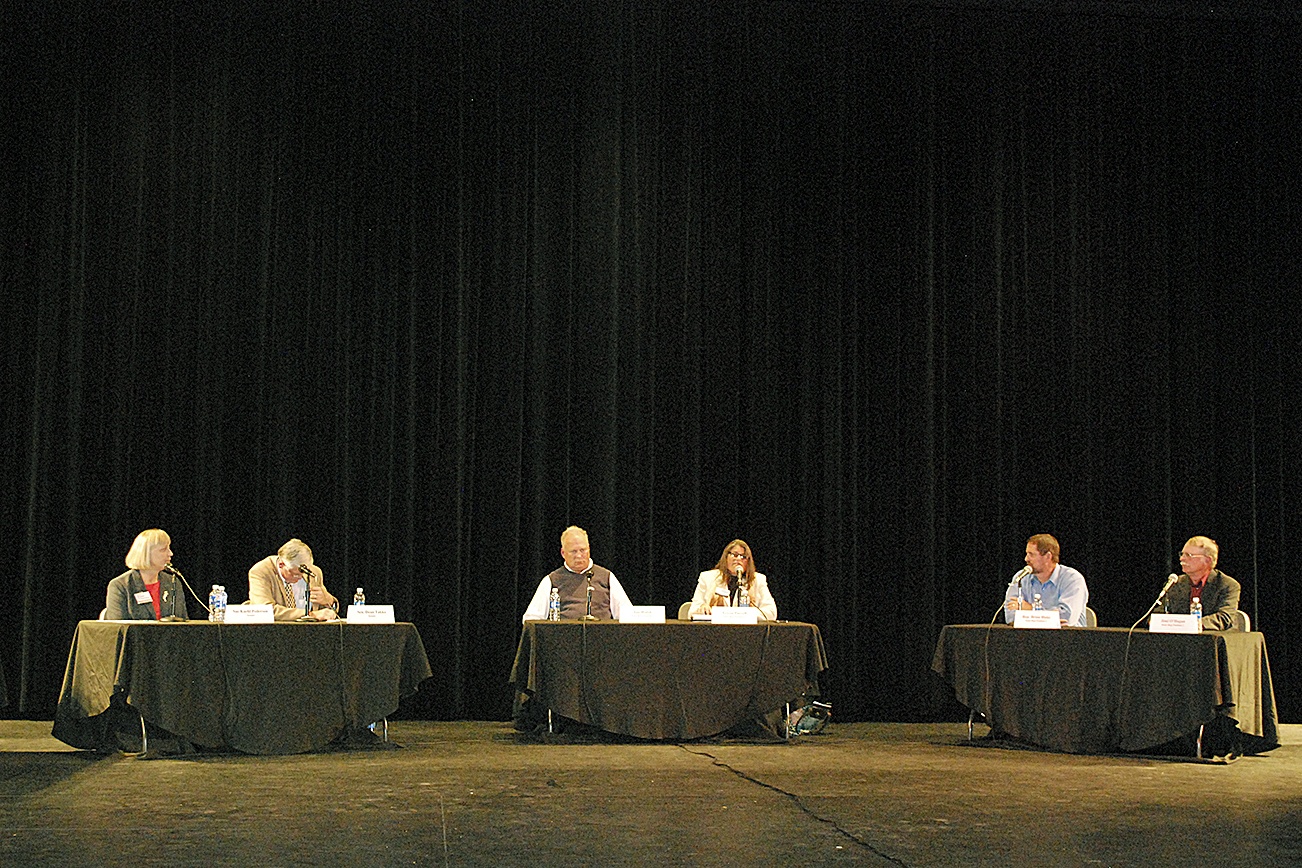Appearing at a campaign forum Thursday night in Aberdeen, candidates for seats in the 19th Legislative District repeatedly stated that the area’s most pressing need is fostering economic development.
Candidates for Senate and two House races took questions from local media that included whether the candidates supported enactment of state income tax, their views on marijuana businesses, and how to raise awareness about needs of this and other rural areas of the state.
Those needs include more attention to homelessness, mental health care, better education funding, unique infrastructure challenges, and whether firearms should be more tightly regulated.
When asked how to provide incentives to bring industry to areas not along I-5, both candidates for state Senate, Dean Takko, the Longview incumbent and Democrat, and opponent Sue Kuehl-Pederson, the Republican challenger from Aberdeen, agreed it was a problem.
Kuehl-Pederson said the disparity in employment numbers between the Seattle area and Grays Harbor County makes it seem as if the areas “were like two different states.” More job creation efforts aimed at this region are necessary because most state programs focus on Puget Sound and largely ignore the rural areas, she said.
However, while more attention on the needs of rural areas is important, most new jobs require workers with targeted skills sets and an adequate infrastructure for such businesses to flourish and that needs to be kept in mind when such incentives are created, Takko replied.
“You’ve got to have infrastructure and people educated to do those jobs,” he said.
Both of them were concerned about the pressures on fishing resources. Takko said focus should be on controlling predators such as cormorants that eat fish raised in hatcheries.
Pederson agreed and said other predators, such as sea lions, “are a huge problem.”
She said hatchery and natural fish are alike — despite what many people believe. “They aren’t little Frankenfish,” Pederson said about the fish born and raised in hatcheries.
The most verbal sparring went on between Jim Walsh, an Aberdeen Republican, and Teresa Purcell, a Longview Democrat, both of who are running for open House position 1 seat.
Asked about statistics showing how rural areas are plagued by chronic health problems, Purcell talked about the importance of helping rural communities attract more health care providers and improving the physical condition of these residents. Public-private partnerships could make a difference and as an example she cited a Longview program that received state funding to teach healthy cooking.
A state grant “to cook kale … and to teach people to sing ‘Kumbaya’?” Walsh asked. “We need private sector, family-wage jobs. … We don’t need the tail wagging the dog.”
Later, when asked about the state’s role in supporting business development, Purcell said Walsh’s philosophy of letting the private sector lead the way hasn’t worked in rural areas. She said at least some government intervention can help get things moving and mentioned improving the area’s spotty internet service is one way to increase its ability to draw in jobs and workers.
“The world is changing,” she said. “Young people want a better quality of life.”
Walsh said many legislative actions are hampering development. For example, administrative rules need to have a short and automatic sunset clause.
At one point, Purcell pointed out that Walsh has lived in the area for a much shorter amount of time that she has. She’s a native.
“I’ve lived here 15 years,” Walsh shot back.
House position 1 opponents Brian Blake, the Aberdeen incumbent Democrat, and Jimi O’Hagan, a Republican from Grayland, find fault with the state’s marijuana industry.
Blake said the state could have done a better job of implementing the rules governing this burgeoning industry, such as restructuring taxation.
Many rules implemented to govern the marijuana industry were meant to “eliminate the black market,” Blake said.
O’Hagan expressed concern about easier access to marijuana in the state leading to increased levels of obesity and a life cycle of “depression, economic hardship and dependency. … It has to be regulated and watched very carefully.”
When asked what should be done to finance efforts to improve worker training at area community colleges, Blake said,
“It’s a matter of tailoring programs and working with the colleges, looking for partnerships in training employees.” Blake said.
O’Hagan said he was concerned “about a lack of common sense” among people in higher education.
The system needs to be re-evaluated because it creates too many “parasites” and “predators,” but not enough “producers (who) are carrying the entire tax burden,” O’Hagan said.
The fast-paced question-and-answer session later gave way to more relaxed open discussion about guns, homelessness and the economy.
Initiative Measure 1491, which would allow police or people close to someone with mental issues or who are prone to harming themselves or others, to obtain court orders temporarily stopping the person from accessing firearms.
Opposition to the bill was readily apparent. Walsh said it prevented constitutionally guaranteed due process and Pederson said it would be redundant because current law allows for this. Takko said it was simply “poorly written.”
Purcell said, however, that the need to offer protection to people who are threatened by people who are mentally unbalanced, is justification for taking that person’s gun away. Gun advocates often point out that mental illness, not guns, is the cause of shooting tragedies and this would address that, she said. She also pointed out that a judge would have to agree before someone’s gun rights were affected.
All six candidates opposed a plan by Attorney General Bob Ferguson to seek a ban on the sale of assault weapons and high capacity ammunition magazines.
The panel of interviewers were members of the local media: Doug Barker, editor, The Daily World; Dave Haviland, news director, Jodesha Broadcasting; and, Pat Anderson, operations manager, Alpha Media.



